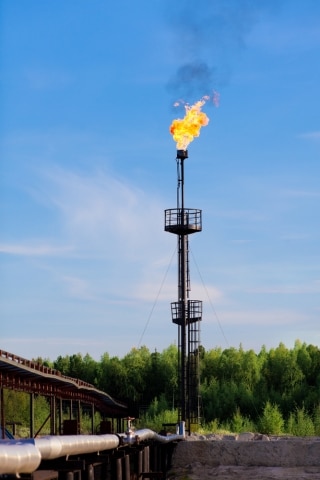On Tuesday, 64 environmental groups, representing over 1 million members and supporters, submitted a legal petition to the Environmental Protection Agency, calling on the federal government to more closely regulate toxic air pollution from oil and gas drilling sites.
“Continued, uncontrolled toxic pollution from oil and gas production creates serious health threats in metropolitan areas across the country,” the groups wrote, warning that over 1.04 million oil and gas wells have been drilled in the U.S. and as many as 45,000 new wells are expected annually over the next two decades.
The petition represents a shot across the bow of the EPA, as the filing lays the groundwork for lawsuits by environmental groups should the agency fail to act.
The move puts the EPA on notice that it may be violating federal law by failing to regulate air pollution from oil and gas drilling and fracking sites. “EPA also has a responsibility under the Clean Air Act to protect people from toxic air emissions nationwide,” the groups wrote, “and under section 112(n)(4)(B) it must do so.”
“Absolutely this lays the groundwork for possible future litigation,” said Jeremy Nichols, a program director for WildEarth Guardians, one of the signatories to the petiton, “oil and gas wells are one of the most under-regulated sources of toxic air pollution in the U.S., yet these very wells are increasingly being drilled and fracked in communities across the nation.”
The current shale drilling boom has led to a massive spike in the number of people living near drilling, and the lack of federal regulation over the industry has led to complaints from residents across the US about the impact on their health and the health of their families.
“More than 150 million Americans now live near oil and gas wells or above shale areas where companies are looking to drill or engage in hydraulic fracturing, and EPA needs to set standards that restrict the hazardous air pollutants they put into the air,” said Earthjustice attorney Emma Cheuse, who filed the petition on behalf of the groups. “Oil and gas wells release chemicals linked to cancer, birth defects, and respiratory disease, and EPA should protect our communities, especially our children, from exposure to these hazards.”
It’s not only rural residents who are impacted by drilling, but also those living in cities and suburbs.
“This oil and gas expansion has brought drilling activities closer to heavily populated areas, including the Dallas/Fort Worth, Pittsburgh, Denver, and Los Angeles metropolitan regions, placing drill rigs near homes, schools and workplaces and posing an ever increasing threat to public health,” the petition says.
“Despite widespread awareness of the rapid expansion in domestic oil and gas production, health concerns about the increased number of wells have not been adequately addressed.”
Last year, the Obama administration’s Department of Energy Advisory Board called for swift action to address the oil and gas industry’s air pollution, including leaks of the powerful greenhouse gas, methane, which has global-warming effects 86 times more dangerous than carbon dioxide in the first two decades after it enters the atmosphere.
“Measures should be taken to reduce emissions of air pollutants, ozone precursors, and methane as quickly as practicable,” the federal advisors wrote.
But the EPA’s current rules — even taking into account air pollution regulations finalized in 2012 — still fail to prevent over 90 percent of emissions, the petition charges. “Under EPA’s current regulations for the oil and gas sector (which do not directly regulate toxic pollution coming from oil and gas wells or set necessary protections for people living near them),” it says, “it is estimated that less than 10 percent of the industry’s total hazardous air pollutant emissions will be reduced.”
The petition further charges that EPA has underestimated the amount of hazardous air pollutants, like benzene and toluene, that are released by the industry nationwide. In 2011, EPA estimated that roughly 127,000 tons of these dangerous chemicals are released each year, the petition says, while in fact, the actual figure may be more than double that, the groups calculated.
The EPA has also repeatedly come under fire for underestimating the amount of another emission from the natural gas industry – the greenhouse gas methane.
A major study, published in the prestigious journal Science earlier this year, concluded that the EPA has understated methane leaks by between 25 and 75 percent, and more recently, measurements over drilling sites in Pennsylvania recorded methane leaks during drilling that were over 1,000 times the levels EPA believed would leak during that process.
The toxic air pollutants associated with fracking include deadly chemicals like benzene, formaldehyde, hydrogen fluoride and hydrogen sulfide gas, the petition notes. “Nationwide, the key pollutants that contribute most to the overall cancer risks are formaldehyde and benzene,” the EPA pointed out in a 2005 fact sheet.
Hydrogen fluoride, the CDC warns, is a highly corrosive and odorless gas that can be fatal in even small doses, and hydrogen sulfide is so deadly that OSHA warns that “[e]ffects can occur within a few breaths, and possibly a single breath.”
“I’ve witnessed the harm these toxics cause to people and given everything we know about these pollutants, the EPA must take action to protect communities from exposure to these clear hazards,” said James Dahlgren, MD, an internist with a sub-specialty in toxicology and member of Physicians for Social Responsibility-Los Angeles, which joined in the filing. “Oil and gas wells release chemicals that have clearly and definitely been linked to health harms from nose bleeds and headaches to cancer, birth defects, and respiratory disease.”
The groups not only called attention to better known sources of these dangerous air emissions, like compressor stations, flaring, and venting of natural gas wells, but also risks posed by the open pits where state regulators in places like Texas and Pennsylvania allow fracking wastewater to be stored. “As the pits, in particular, are typically open to the air, the volatile chemicals contained in the fluids—such as BTEX compounds [benzene, toluene, ethyl benzene and xylene] and hydrogen sulfide—will inevitably evaporate and escape into the air.”
While the groups are pressing for action within 180 days from EPA, the law allows the agency to take its time in reviewing the filing. The Obama administration has indicated that it supports an expansion of domestic oil and gas drilling under its all-of-the-above energy policy, so some are worried that the agency may drag its heels. “We will review the petition,” an EPA spokeswoman told the Center for Public Integrity on Tuesday.
“EPA has an obligation to respond to a petition like this,” added Mr. Nichols, “but there is no clear deadline, so there is concern that they could sit on it.”
Photo Credit: Burning Oil Gas Flare, via Shutterstock.
Subscribe to our newsletter
Stay up to date with DeSmog news and alerts







